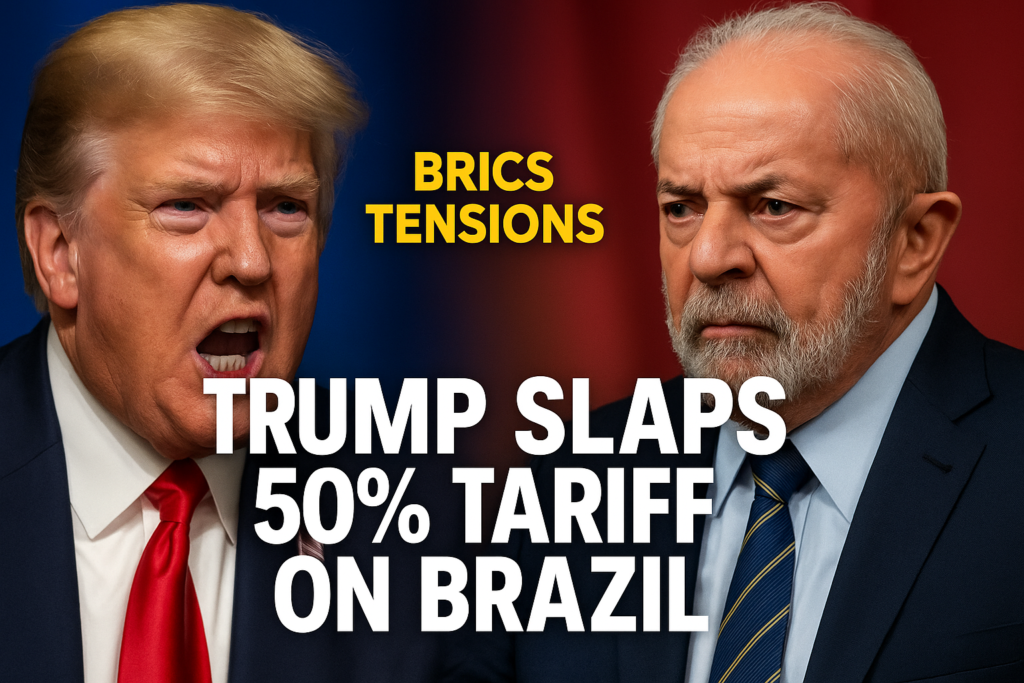Trump imposes 50% tariff on Brazil after Lula’s BRICS comments. Rising U.S.-Brazil tensions threaten trade, economy, and global diplomacy.
Introduction: The Trade War Heats Up
U.S. President Donald Trump has once again stirred the global economic waters. This time, his target is Brazil. In a fiery turn of events, Donald has imposed a massive 50% tariff on Brazilian imports starting August 1, 2025. The decision follows a heated exchange between Trump and Brazil’s President Luiz Inácio Lula da Silva, Brazil’s 39th and current head of state.
The BRICS Conference Clash
How the Conflict Began
The roots of the conflict trace back to the BRICS Summit, where Trump sharply criticized the alliance—comprising Brazil, Russia, India, China, and South Africa—labeling it “anti-America.” Trump even threatened to impose an additional 10% tariff on all BRICS countries, citing economic retaliation.
Lula’s Bold Response
In response, President Lula defiantly stated,
“The world has changed. We don’t want an emperor. We are a sovereign nation.”
Lula warned that if Trump proceeded with tariff hikes, other nations had the right to retaliate against the United States. These strong words clearly irked Trump, prompting him to immediately announce the 50% tariff on Brazil.
Trump’s Justification for the Tariff

Escalation from April to August
Trump explained that the tariff, which had stood at 10% in April, was now being increased fivefold due to Brazil’s recent actions. In a letter released via social media, Trump stated that the tariff is a direct response to:
Brazil’s alleged attacks on American companies through “digital trade restrictions.”
The ongoing legal proceedings against former Brazilian President Jair Bolsonaro.
Brazil’s Supreme Court regulations on social media, which Trump called a threat to “American free speech.”
Trump also invoked Section 301 of the 1974 Trade Act, directing U.S. trade representatives to investigate Brazil’s policies for “unfair trade practices.”
Trump’s Support for Bolsonaro
“This Is a Witch Hunt” – Trump Defends Bolsonaro
Trump’s statement heavily supported former President Bolsonaro, calling the legal cases against him a “witch hunt.” Bolsonaro is currently facing charges related to an alleged coup attempt following his 2022 election defeat.
Trump wrote:
“I cannot stand by while Brazil attacks free elections and suppresses American speech rights.”
Highlighting his long-standing friendship with Bolsonaro, Trump expressed concern over the increasing legal pressure on the former president.
Lula’s Strong Rebuttal
Brazil Doesn’t Need a “Tutor,” Says Lula
In a firm response, Lula convened an emergency meeting with top officials including Finance Minister Fernando Haddad, Foreign Minister Mauro Vieira, and Vice President Geraldo Alckmin. Following the meeting, Lula took to social media and declared:
“Brazil does not need a tutor. We will not accept foreign interference or threats. Those planning coups are facing trials, and no outsider can intimidate us.”
Lula also warned that if the U.S. imposed unilateral tariffs, Brazil would take reciprocal measures under its Economic Reciprocity Law.
Who Will Suffer the Most?
Brazil Takes the Bigger Hit
Experts believe Brazil stands to lose more in this economic face-off. U.S. tariffs on major Brazilian exports like steel, aircraft, and machinery could significantly impact the economy.
One of Brazil’s leading aircraft manufacturers, Embraer, has already seen its American Depository Receipts (ADRs) drop by 9% since the announcement.
Additionally, Brazil’s currency, the Real, has depreciated by over 3%, indicating the growing market anxiety.
Impact on Bilateral Relations
A Trade Row with Diplomatic Consequences
According to Sonang Sarot, an economist at UBS Global Wealth Management:
“This is not just a trade issue. A 50% tariff could make it nearly impossible for Brazilian businesses to operate in the U.S.”
Sarot warned that Lula’s “unwanted emperor” remark may have triggered long-term consequences. He advised Lula to urgently resolve the matter through diplomatic dialogue.
A One-Sided Trade Equation
Brazil Already Runs a Trade Deficit with the U.S.
Ironically, Brazil already imports more from the U.S. than it exports. In 2024, Brazil imported $44 billion worth of American goods, while the U.S. imported $42 billion from Brazil.
Despite being at a disadvantage, the U.S. still imposed harsher tariffs—an act Brazil deems unjustified.
U.S. Relies Heavily on Brazilian Goods
Coffee, Cocoa, and Beef in High Demand
Brazil supplies several critical goods to the United States:
In 2024, the U.S. imported $1.4 billion worth of beef from Brazil, filling its domestic meat shortages.
The U.S. also imported nearly $2 billion worth of coffee, a product not grown domestically.
Brazil remains a top exporter of cocoa, essential for U.S. chocolate manufacturers.
This heavy reliance makes the trade tensions even more complex.
The Final Exchange
Trump’s Harsh Words & Lula’s Diplomatic Push
At a press briefing during a White House event with African leaders, Trump declared:
“Brazil hasn’t been good to us. Not good at all.”
Meanwhile, Lula, after the conclusion of the BRICS summit, criticized Trump, calling his social media threats “irresponsible.” He urged global leaders to explore alternatives to the U.S. dollar, suggesting that nations should reduce their dependency on American economic influence.
Conclusion: A Dangerous Trade War in the Making
This escalating trade dispute between two powerful democracies is more than a tariff conflict—it’s a clash of ideologies and political egos. With Trump defending Bolsonaro and Lula standing firm on national sovereignty, the U.S.-Brazil relationship faces an uncertain future. As global markets react and diplomatic channels heat up, all eyes remain on what the next move will be—from either side.
Who will blink first? Lula or Trump?
